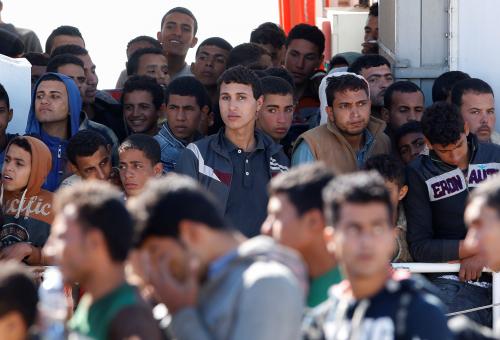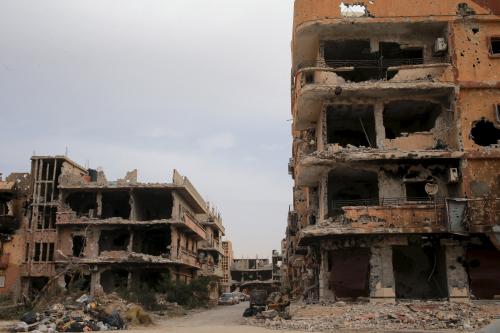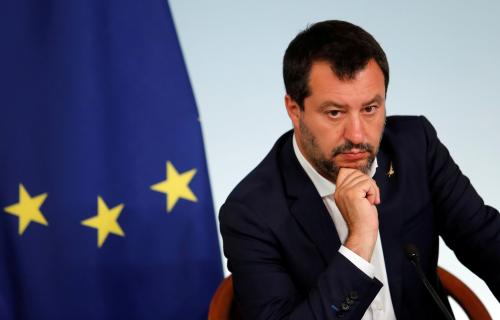My perch at Brookings provides an exceptional vantage point from which to observe Italy’s relationship with its American ally and European partners. One year into the job of being the Italy Program fellow here, I wish to share some observations with you. I do so at a time when Italy is slowly recovering—both economically and diplomatically—from the embarrassment of the Berlusconi years. I sincerely hope that, as you will soon take up your new position, my tips might be of some help.
Be realistic about Italy’s relevance
Ambassadors, high-ranking civil servants, and politicians are obliged to claim otherwise, but let’s face it: Italy is not a top dog on the global stage. A middle-sized country with an ageing population and an economy that performed poorly for over two decades, Italy does not carry the weight of some European partners. Not to mention the United States, China, Russia, or even Brazil, India, South Africa, Turkey, Saudi Arabia, or Indonesia. At the next G-20, the new U.S. secretary of state will shake many other hands before yours.
Pair up strategically to matter more
Lucky for you, there are plenty of other European countries that are hungry for some additional exposure. While Germany is too dominant, the U.K. is too “outside,” and France always overestimates itself, Spain could possibly be a good match. Rome and Madrid share a multitude of concerns, are good economic and cultural matches, and have the Mediterranean geopolitical space in common. When and if Spain sorts out its domestic politics, go for tapas in Madrid, outline shared interests, and explore whether a strategic partnership could be on the cards.
Find niche capabilities
It’s not all bad news. Italy can matter, particularly when it provides Washington with a specific added value. Capitalize on comparative advantages—be they tactical nuclear weapons in Aviano as NATO comes back into fashion or precious human intel on the ground for fighting ISIS in Libya. To its European partners, Italy could be a smarter asset in the Mediterranean. But for that to be the case, all instruments have to work in sync: Italian diplomacy, military, trade, aid, and intelligence must truly make it a Mare Nostrum. Ask Paris for tips about harmonizing messages.
Cultivate Washington and Berlin above all
One downside to globalization: There are now too many relationships to keep track of. You’ve got to focus. The United States may be a historically declining power flirting with isolationism, but it will still be the indispensable nation for our generation. Make sure you make some special friends and know your way around in D.C. And Germany will be Europe’s hegemon for the foreseeable future. Not because of its often overestimated strength but, rather, because of its European partners’ structural weaknesses. Remember that, in Berlin, politics is a sub-branch of moral philosophy.
Find ways to work around the system
As in other policy domains and institutions, Italy’s diplomatic corps is blessed with some exceptional individuals working in a swamp of mediocrity. As you strive to replace the latter with the former, you will still have to be smart at handling the bureaucratic machinery. Do make extensive use of back channels to send out messages. And, crucially, please be receptive to messages sent your way via the same channels. Doing so will shield you from bureaucratic inertia while multiplying your diplomatic avenues and international standing.
Continue the generational turnover
Italy is (still) a gerontocracy. That’s a shame given the amount of brilliant fresh blood available. More than that, it’s counterproductive (which is D.C.-speak for “blindingly dumb”) not to make the most of a generation that has been culturally and professionally globalized to an extent that its parents could not have even dreamed of. Shake up the system and seek out professional mavericks and intellectual troublemakers: if put in positions where they are able to flourish, they will provide you with tremendous insights. And start getting rid of the dinosaurs—soon you won’t need their patronage anymore, anyway.
Go for the informal brownbag meeting
Italian diplomatic circles tend to go for ostentation and formalities rather than rolling up sleeves and building bridges behind the scenes. As it is often the case when dealing with mediocrity, there seems to be an emphasis on status and splash to the detriment of substance and know-how. This is a shame. With that kind of attitude, Italy misses out on countless opportunities to reach out to the informal movers and shakers that can open doors and strike deals. Don’t recoil at the thought of a casual working breakfast over doughnuts. Even if American coffee is terrible.
Revolving doors exist for a reason
I once had a boss at the U.N. who refused to hire people that had spent all their lives working for the U.N. Basically, you can’t really expect people that always lived within the system to actually change it. Americans are much better than Italians at making the most of revolving doors. Pull in people from the real world—the field, think tanks, and the private sector—and position them to support you in bringing about change. You need perspective and people who think outside the box in order to reform the box itself.
Discern between competitors and allies
The number of both professionally outstanding and mediocre individuals is a constant throughout time and space. What matters is the position these people occupy within the system. As you seek out the good eggs to support you, you inevitably also give them the opportunity to challenge you. Within this category, learn to discern between those who want your job and those who actually couldn’t care less about stealing it from you. Be politically ruthless with the former and make closest allies of the latter.
Get yourself a 21st Century Jean Monnet
On the way to even greater achievements, you will have to cover your back. And to do this properly, you’ll have to spend quite some time in Rome’s political circles. Sorry about that. Together with additional formal powers, you will unfortunately also have much less freedom of action. Find someone that you can trust that is able to “work below the radar” on your behalf. To sign the official deals and get the credit that you deserve for bringing about change, you need an informal European hand. Get yourself a 21st century Jean Monnet.
Scratch the surface, and you will see that Italian diplomatic and foreign policy circles abound with brilliant people. Unfortunately, most of the time these individuals find themselves having to operate within nepotistic, provincial, and mediocre professional environments. Because of this and despite their outstanding efforts, Italy is a country that traditionally punched well below its diplomatic weight. Things might be slowly changing and I am confident that your arrival will be beneficial in this respect. I hope I can begin to help by sharing these observations, and godspeed.
The Brookings Institution is committed to quality, independence, and impact.
We are supported by a diverse array of funders. In line with our values and policies, each Brookings publication represents the sole views of its author(s).








Commentary
From Washington with love: An open letter to the next Italian foreign minister
Monday, August 15, 2016